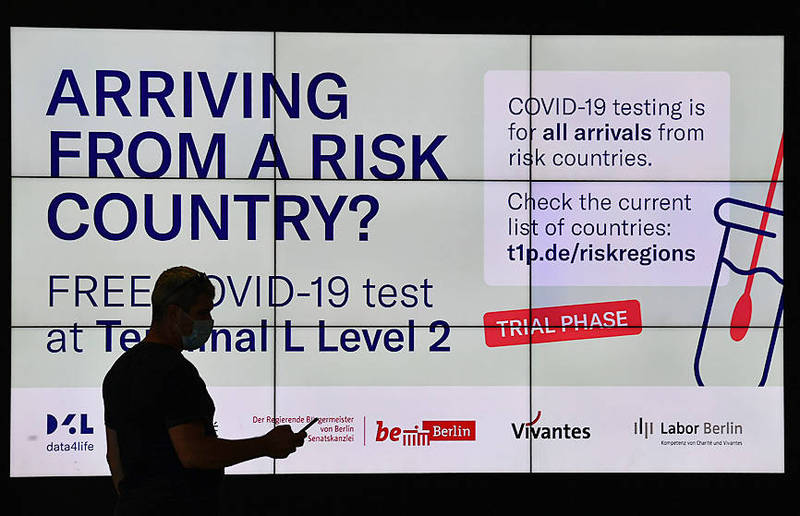《TAIPEI TIMES》 Mass testing debated at Taipei forum

A man checks his cellphone in front of an illuminated billboard promoting free COVID-19 tests for travelers arriving at Berlin-Schoenefeld airport in Schoenefeld, Germany, on July 31. Photo: AFP
By Lee I-chia / Staff reporter
Public health experts and medical specialists yesterday debated whether conducting mass testing for COVID-19 on all travelers arriving in Taiwan is needed to bolster prevention efforts against SARS-CoV-2, and there seemed to be some agreement that it was not needed for the general public at this time.
The topic has become subject of heated public debate after an asymptomatic teenager under quarantine in Changhua County tested positive for COVID-19, highlighting the practice of the Changhua County Public Health Bureau to test the hundreds of people in the county under 14-day home quarantine after returning to Taiwan even if they had no COVID-19 symptoms.
The move appears to contravene the Central Epidemic Command Center’s (CECC) quarantine policy, which does not allow people under quarantine to leave the place they are isolating, and for people to be tested only if they report symptoms.
The CECC last week ordered an investigation into why and how the Changhua bureau has been running its testing program.
A conference was held in Taipei yesterday by the Taiwan Society of Microbiology, the Taiwan Society of Clinical Pathologists and the Society of Taiwan Long-Term Care Infection Prevention and Control, to discuss the pros and cons of mass testing.
The highly contagious nature of SARS-CoV-2 has been shown by the fact that more than 23 million people have been infected and more than 800,000 people have died, said Centers for Disease Control (CDC) Deputy Director-General Chuang Jen-hsiang (莊人祥), who also serves as the CECC’s spokesman.
Having rapid and accurate testing is a key factor in containing the virus, so the CDC developed COVID-19 polymerase chain reaction (PCR) test methods early on in the outbreak, and Taiwan’s testing capacity has been expanded to more than 65 healthcare facilities nationwide and more than 7,400 tests per day, he said.
The testing numbers would continue to grow, he said.
Tony Chen (陳秀熙), vice dean of National Taiwan University’s (NTU) College of Public Health, said an important point of testing is detecting asymptomatic carriers, but he is not in favor of conducting “mass testing” on the general public, but only on travelers arriving from high-risk countries.
Conducting continuous COVID-19 antibody testing could be an effective method of understanding the past infections, as it would allow the government to understand local infections and community spread, the nation’s herd immunity, and to detect asymptomatic carriers, Chen said.
Such a program would also help in the development of vaccines, he said.
Several nations, including Singapore, the US, the UK, Spain and Iceland, have been conducting antibody testing and surveillance, which can help them understand the neutralizing antibody response in patients with mild symptoms and those with serious complications, and accelerate vaccine development, he added.
There is an urgent need for COVID-19 antibody testing, as no one yet knows how long antibody immunity can last, he said.
Lee Ping-ing (李秉穎), a physician at NTU Hospital’s division of pediatric infectious disease and a member of the CECC’s expert advisory panel, said mass testing could include testing all travelers arriving in Taiwan, and PRC testing and antibody testing on the general public.
However, it was important to remember that while many people cite Iceland as an example of a nation with a mass testing policy, only about 10 percent of its population has been tested for COVID-19, and as it loosened its border control policies after expanding its testing program, the number of local infections began to increase, Lee said.
For Taiwan, the cost of conducting mass PCR testing is too high, while its benefit might be close to none, given that there have been no reports of local infections for a long time, he said.
Another factor is that mass testing on the general public could result in many false-positive returns, which could cause public panic, he said.
新聞來源:TAIPEI TIMES




















